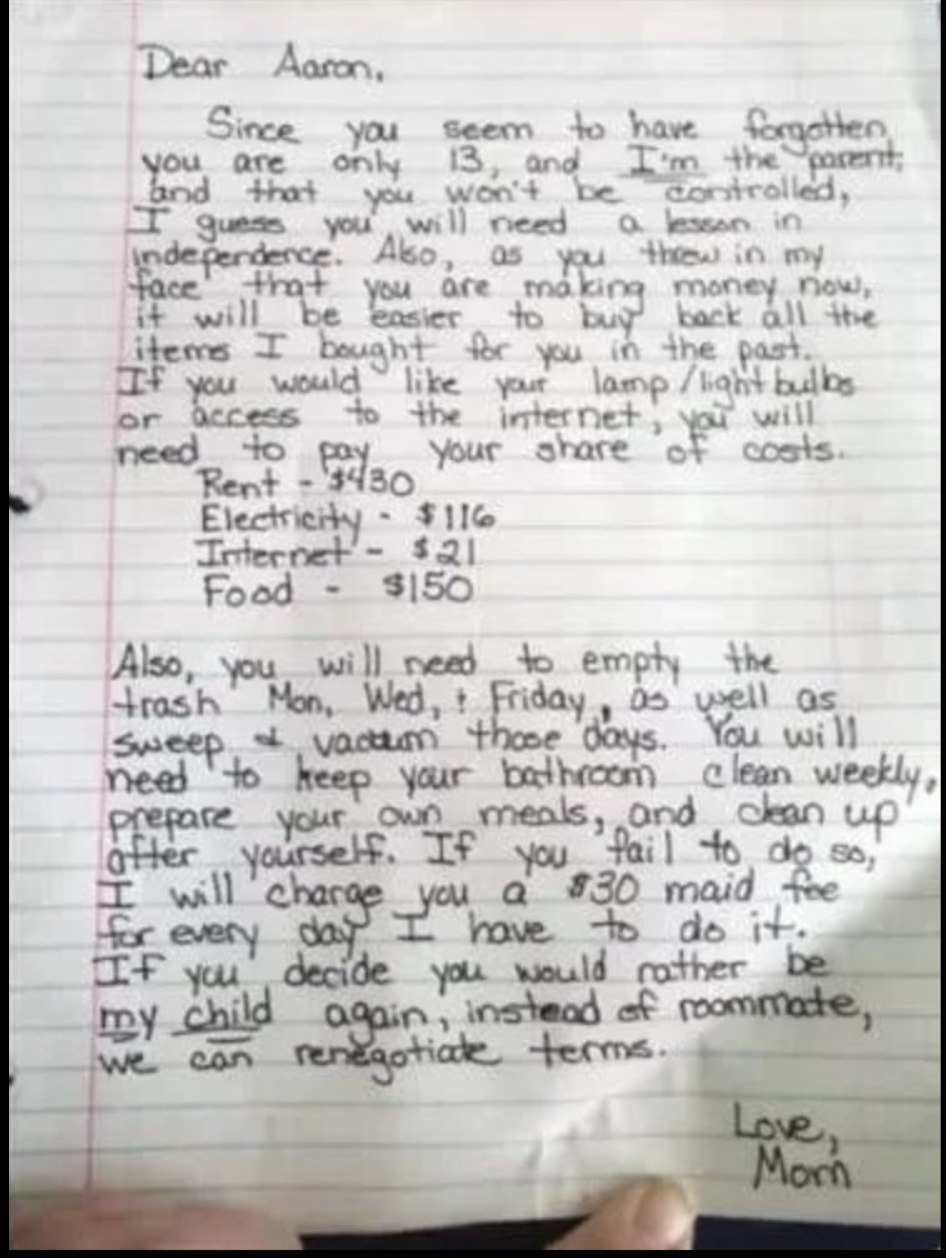Parenting can be a tough job, especially when it comes to teaching children the importance of responsibility and appreciation for what they have. One mother, Heidi Johnson, found a creative way to teach her 13-year-old son, Aaron, a valuable lesson about the realities of life and the responsibilities that come with it.
The Lesson in Independence
In 2015, Heidi faced a common parenting challenge: her son, Aaron, wanted all the perks of growing up but was not ready to accept the responsibilities that come with being an adult. At the time, Aaron was making a small income from his YouTube channel and felt that he was already financially independent. He was defiant and refused to follow his mother’s instructions, even storming out of her room, declaring that he was “free” because he was “making money.”
This behavior led Heidi to pen a tough-love letter to her son. She shared the letter publicly on Facebook, and it quickly went viral. The letter, which she referred to as a “roommate contract,” outlined what Aaron would need to do to continue enjoying the privileges he had at home. The letter read:
“Since you seem to have forgotten you are only 13, and I’m the parent, and that you won’t be controlled, I guess you will need a lesson in independence… If you would like your lamps/lightbulbs or access to the internet, you will need to pay your share of the costs.”
Heidi made it clear that Aaron would have to take on adult-like responsibilities. This included paying for rent and utilities, cooking his own meals, and cleaning around the house. The message was simple: nothing comes for free, and it was time for Aaron to start learning how much effort and money it takes to maintain a home.
 Stressed mom. Credit / Shutterstock
Stressed mom. Credit / Shutterstock
The Reaction
When Aaron saw the note, his initial reaction was one of anger and frustration. He crumpled the letter and tossed it aside before storming out of the apartment. However, after some time to think, he returned to his mom, asking what he could do to start re-earning his privileges.
“He recognized right away that he couldn’t pay rent, utilities, or for food,” Heidi explained. “It was never really about having him pay me back; it was to help him gain an appreciation of what things cost.”
This approach was a wake-up call for Aaron, helping him understand the reality of adult responsibilities and the value of hard work. It was a moment of growth that taught him that independence and freedom are earned, not automatically granted.
A Creative Parenting Style
Heidi’s approach to parenting was praised by many online. One user commented, “Great job. Nothing in the agreement is cruel punishment but will teach him a lesson he will carry through life.” Another shared, “I think you are amazing. You gave your son the opportunity to learn and grow.” Many people recognized that Heidi’s “real world” lesson would benefit Aaron in the long run, helping him understand the importance of responsibility and the consequences of his actions.
Heidi was not looking for praise, but she did respond to critics who felt she had publicly shamed her son. She explained, “A teenager is going to push their limits… I cannot send this child into college or the workforce with the attitude of ‘I’ll get to it when I get to it.’ That is the real world.”
The Impact of Creative Discipline
The “roommate contract” that Heidi wrote for Aaron was not meant to punish him but to help him understand that adulthood requires responsibility. She wanted to instill in him the idea that nothing in life comes free and that sacrifices are made behind every privilege. This kind of lesson is crucial for preparing children for the challenges of adulthood.
As a parent, Heidi’s creative and unconventional approach showed that discipline doesn’t always have to come in the form of punishment. Instead, it can be about teaching important life lessons that will benefit children as they grow and transition into adulthood.
Conclusion
Heidi Johnson’s tough-love letter to her son has become an example of creative parenting, showing that sometimes, the best way to teach children valuable lessons is through real-life consequences and responsibility. By making Aaron understand the cost of living and the effort required to maintain a home, Heidi has set him on the path to becoming a more responsible and independent young adult.
What do you think of this mom’s creative approach? Should other parents adopt similar strategies to teach responsibility? Share your thoughts with us and let’s continue this important conversation!
For further insights, check out these articles:



